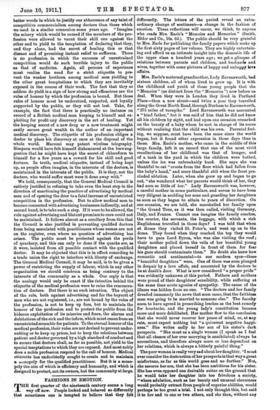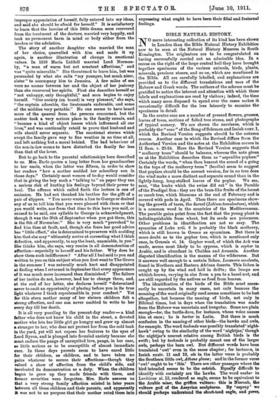FASHIONS W EMOTION. MHE first quarter of the nineteenth century
seems a long -IL- way off now. People looked and behaved so differently that sometimes one is tempted to believe that they felt differently. The letters of the period reveal an extra- ordinary change of sentiment—a change in the fashion of emotion. These reflections will occur, we think, to anyone who reads Mrs. Earle's "Memoirs and Memories" (Smith, Elder and Co., 10s. 6c1.). The public should be very grateful to Mrs. Earle for publishing the family papers which make up the first sixty pages of her volume. They are highly entertain- ing and afford us an intimate insight into the domestic life of the upper class a hundred years ago ; we get a glimpse of relations between parents and children, and husbands and wives, together with some pictures of happy and unhappy loes affairs.
Mrs. Earle's maternal grandmother, Lady Ravensworth, had sixteen children, all of whom lived to grow up. It is with the childhood and youth of these young people that the " Memoirs " (as distinct from the "Memories ") now before 11E1 deal. When they were in London they lived in Portland Place—then a new street—and twice a year they travelled along the Great North Road, through Durham to Ravensworth, "275 miles of turnpike." Lord Ravensworth was accounted a "kind father," but it was said of him that he did not know all his children by sight, and had upon one occasion remarked on the beauty of a baby whom be met in charge of its nurse without realizing that the child was his own. Parental feel- ing, we suppose, must have been the same since the world began, but it found other expression in those days than in these. Mrs. Earle's mother, who came in the middle of this large family, left it on record that one of the most vivid recollections of her childhood was that of hunger, and of a tank in the yard in which the children were bathed, unless the ice was unbreakably hard. She says she was thankful to eat "crusts from the floor which had fallen from the baby's hand," and more thankful still when the frost pre- cluded ablution. Later, when she grew up and began to go out, "she wondered what her parents would think of her, they had seen so little of her." Lady Ravensworth was, however, a careful mother in some particulars, and seems to have been very diligent in scolding her sons and guarding her daughters as soon as they began to attain to years of discretion. On one occasion, we are told, she marshalled her family upon "the Grand Tour, as it was then called, visiting Germany, Italy, and France. Cannot one imagine the family coaches, the courier, the servants, the luggage, with which a rich Englishman travelled in those days ? I was told that when at Rome they visited St. Peter's, and went up on to the dome. They found when they reached the top they would have to pass Lord Byron, who was also visiting the roof ; their mother pulled down the veils of her beautiful young daughters and placed herself in front of them for fear his gaze should contaminate them." No doubt she knew how romantic and sentimental—to our modern eyes—these "beautiful daughters" were. One of them was soon plunged in despair by a love affair, and accounted by the doctors to be at death's door. What is now considered "a proper pride" was evidently unknown at this period. Fathers and mothers were proud of their daughters' sensibility, while suffering at the same time acute agonies of sympathy. The cause of the illness was hidden from no one. "The doctors and her family dreaded immensely the news that soon came, that the faithless man was going to be married to someone else." The faculty seem to have agreed in prescribing leeches as the best remedy for heartache, and the young lady's constitution became more and more debilitated. Her mother flew to the conclusion that she would never recover her peace of mind, or, at any rate, must expect nothing but "a quiescent negative happi- ness." She writes sadly to her son of his sister's dark prospects. "She must as a single woman (I speak as I feel that all chance of her ever marrying is annihilated) always be nece,asitous, and therefore always more or less dependent on her relations, which is always a bitterly painful thing."
The poor woman is really very sad about her daughter. "I must ever consider the destruction of her prospects in that way a great misfortune, as far as this world goes and no further." Not, she assures her son, that she has been ambitious for his sister. She has even opposed one desirable suitor on the ground that he would take her daughter into too frivolous a, society, "where adulation, suoh as her beauty and unusual cleverness would probably extract from people of superior abilities, would perhaps be too great a trial. I not only thought this, but said it to her and to one or two others, and she then, without any improper appreciation of herself, fully entered into my ideas, and said she should be afraid for herself." It is satisfactory to learn that the heroine of this little drama soon recovered from the treatment of the doctors, married very happily, and took no permanent harm in mind or body either from the leeches or the adulation.
The story of another daughter who married the man of her choice, quarrelled with him and made it up again, is another illustration of change in emotional values. In 1818 Maria Liddell married Lord Norman- by, "a man of warm but not constant affections," and was "quite miserable." She threatened to leave him, but was persuaded by what she calls "my younger, but much nicer, sister" to accompany him to Jamaica. A few miles of sea were no sooner between her and the object of her jealousy than she recovered her spirits. Fitst she describes herself as "not unhappy, only thoughtful," and soon begins to enjoy herself. "Our society (on board) is very pleasant," she says, "the captain adorable, the lieutenants endurable, and some of the middies very pettable." No one seems to have heard more of the quarrel from the persons concerned, but the matter took a very serious place in the family annals, and "became a kind of object lesson which influenced all our lives," and was continually retold to prove that husband and wife should never separate. The emotional storms which swept the family gave way to fine weather in no time at all, and left nothing but a moral behind. The bad behaviour of the son-in-law seems to have disturbed the family far less than that of the lover.
But to go back to the parental relationships here described to us. Mrs. Earle quotes a long letter from her grandmother to her uncle, when the latter was fifteen, in order to show her readers "how a mother scolded her schoolboy son in those days." Certainly most women of to-day would consider that in giving the boy such a "talking to" on paper they ran a serious risk of hurting his feelings beyond their power to heal. The offence which called forth the lecture is one of omission. He had not thanked his brother for the gift of a pair of slippers. "You never wrote a line to George or desired any of us to tell him that you were pleased with them or that you would write, nor from that time to this have you said, or caused to be said, one syllable to George in acknowledgment, though it was the 30th of September when you got them, this is the 8th of November." She is very much "provoked" to find him thus at fault, and, though she fears her good advice has "little effect," she is determined to persevere with scolding him that she may "ultimately arrive at correcting what I think defective, and apparently, to say the least, unamiable, in you." She thinks him, she says, very remiss in all demonstration of affection—especially to herself and his father. Why does he show them such indifference P "After all I had said to you and written to you on this subject when you first went to The Grove in the summer I was naturally much hurt and disappointed at finding when I returned in September that every appearance of it was much more increased than diminished." The failure of her tactics do not, however, lead her to change them, and, at the end of her letter, she declares herself "determined Bever to omit an opportunity of placing before you in its true light whatever I think reprehensible in your conduct." Yet for this stern mother many of her sixteen children felt a strong affection, and one son never omitted to write to her every day till her death.
It is all very puzzling to the present-day reader — a kind father who does not know his child in the street, a devoted mother who lets her little girl go hungry and grow up almost a stranger to her, who does not protect her from the cold tank in the yard, yet will not expose her features to the eyes of Lord Byron, and is plunged into frenzied anxiety because she must endure the pangs of unrequited love, pangs, in her case, so little serious as to be susceptible of almost immediate cure. In those days parents seem to have cared little for their children, as children, and to have taken no pains whatever to secure their affections—though they valued a show of affection from the child's side, and inculcated its demonstration as a duty. When the children began to grow up they made friends with them, and former severities were forgotten. Mrs. Earle assures us that a very strong family affection existed in later years between all these children and their parents, and apparently A was not to no purpose that their mother rated them into expressing what ought to have been their filial and fraternal feelings.











































 Previous page
Previous page